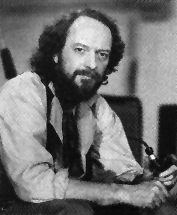![]()
| Ian Anderson - In His Own Words |
|
![]()
|
Ian Anderson personified Jethro Tull. His hopping on one leg while playing the flute excited the audience but belied a serious mind with other interests besides rock'n'roll. |
![]()

![]() ethro Tull was always a band that went out like Led Zeppelin. We went out to clean up, to work six, seven nights a week, and make money.
ethro Tull was always a band that went out like Led Zeppelin. We went out to clean up, to work six, seven nights a week, and make money.
We didn't go out like the Rolling Stones and rent two floors of a hotel and have bodyguards and a vast entourage of people that ate up every cent of profit. We went out with the guys in the band and two or three road managers. Everything was done low-budget.
|
Jethro Tull's Seventies Billboard Top 40 Singles "Living In The Past" 11/72 #11 "Bungle In The Jungle" 11/74 #12 |
We came in during the progressive-rock era, which coincided with a boom in FM radio and the whole idea that you could do something that didn't have a catchy chorus, and you didn't have to wear a suit on stage. You could break all the rules that had ever been written, never even release a single, and still have a Number 1 album.
I was always seen as a bit of an eccentric character on stage. People thought I was forty when I was twenty. On our first album, This Was, we all appeared as old men, as a spoof. We couldn't believe anyone would take it seriously. But when we arrived in America for our first tour, people said, "We thought you guys were old -- forty, fifty, even sixty". They were really let down when they found us to be twenty and twenty-one.
Our image wasn't carefully thought out or manufactured. I was never particularly outgoing as a child. When I got into music, I wasn't a showman. I found it easier to hide behind an image. I wasn't trying to create a gray impression. I was actually hiding from the world be wearing a long overcoat and pretending to be eccentric. I just wanted to be totally outside my peer group, and that's how I covered up my basic insecurity. By becoming another person onstage, it lets the private individual off the hook.
 |
"Outside of music, my life is a strange mixture of academic science, biology, husbandry, and entrepreneurial flair." |
I never could have lived the life-style attributed to me. I can never be the character I portray on stage. I'm always surprised when people think I should be a lot crazier than I am.
I chose the flute because I wanted something unusual in the context of a rock band and yet very portable and pocketable because I literally left home with a carrying bag containing a few belongings and that big overcoat. That's all I had when I went away. The flute was nice because when it was disassembled it fit very nicely into a small box in my pocket. I really liked the idea that I could produce something from my pocket and make music on it.
|
Jethro Tull's Seventies Billboard Top 10 Albums Aqualung 6/71 #7 Thick As A Brick 5/72 #1 Living In The Past 12/72 #4 A Passion Play 8/73 #3 War Child 12/74 #3 Minstrel In The Gallery 10/75 #9 Songs From The Wood 5/77 #9 |
From 1971 onward, I began telling everybody that our next tour would be our last tour. By everybody, I don't mean the public or the press, but the guys in the group and management. I'd say, "Look, this really is it, guys. After this tour, that's it. I can't do it anymore." Of course, after the last tour, we'd say, "All right, one more tour, one more record." It just never petered out.
|
Jethro Tull Lyrics Jethro Tull Videos |
I started to see that I didn't actually have to stop playing music completely. I saw that I could carry on with music, but at a level that would be fun, where I didn't have to be Ian Anderson, the rock star, or Ian Anderson, from Jethro Tull, to everyone I met. I could be Ian Anderson, salmon farmer, and not have to talk abut music all the time, which was very exciting.
Outside of music, my life is a strange mixture of academic science, biology, husbandry, and entrepreneurial flair. That's what fish farming is all about. The people in that industry no longer say, "Oh, he can't be serious. He's just some pop musician who made a few bucks and is now trying to lose it quickly doing something else."
I've been fish farming for eight years. Relatively speaking, I'm one of the early starters in the industry. I have respect from people in that business now, and I don't find the idea of being a musician as getting in the way, except when I have to say, "OK," to the people who work for me, "you're on your own for a few months. I'm off to make another record." ![]()
![]() Reader's Comments
Reader's Comments
No comments so far, be the first to comment.
| Check out the |  |  |
